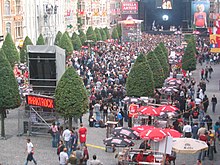Marktrock
| Marktrock | |
|---|---|
 |
|
| Genre | Alternative rock, Pop, Dutch |
| Dates | Friday+weekend closest to 15 August |
| Location(s) | Leuven, Belgium |
| Years active | 1982 - ? |
| Website | |
| www |
|
Marktrock is a music festival held each year around 15 August, in the heart of the university town of Leuven, Belgium. There is also a smaller Marktrock festival in Poperinge which is held the last Saturday of August.
The name Marktrock comes from the Dutch word markt, meaning market and it is held on 2 squares (4 until 24th edition) in the historical city center of Leuven: "Oude Markt" and "Ladeuzeplein". Until the 24th edition (2006) the three-day festival always had 15 August Assumption Day as its last day.
In 2004, the 22nd edition of the Marktrock festival was held in Leuven and it has grown into one of Europe's biggest urban music festivals with over 350,000 visitors each year.
On 5 February 2007 the Marktrock vzw organization announced the end of the festival. Main reasons were the raising price of quality artists and groups, the low capacity of the main stage on the "Oude Markt", the new and expensive legal regulations each year, the financial risk of open-air festivals and the organization refused to raise entry tickets for the "Oude Markt" stage again. The rain during the 2006 edition certainly didn't help either. Over the 24 years history of the original MarktRock more than 1400 artists performed at Marktrock, more than 5 million people visited the festival and it launched several Belgian artists.
In March 2007 Marktrock came under new management, which revived the festival and redesigned the 2007 edition. The free stages disappeared, replaced by two paying stages: the Oude Markt focused on local and upcoming bands, while the larger Ladeuzeplein featured established and international artists. This new setup met with significant criticism and attendance was low.
For the 2008 edition, the festival was once again revamped, bringing back the various free stages throughout the city, leaving only the Oude Markt with an entry fee. The festival still struggled to draw the crowds it used to draw.
The 2009 festival changed its approach once more, ditching both the entry fee and international acts. It secured additional funding from the city of Leuven on the condition that the festival would focus on local talent. Despite a line-up of mostly obscure bands, this edition drew an estimated 95,000 visitors, causing minor organisational problems as visitors were turned back from venues that were filled to capacity.
...
Wikipedia
